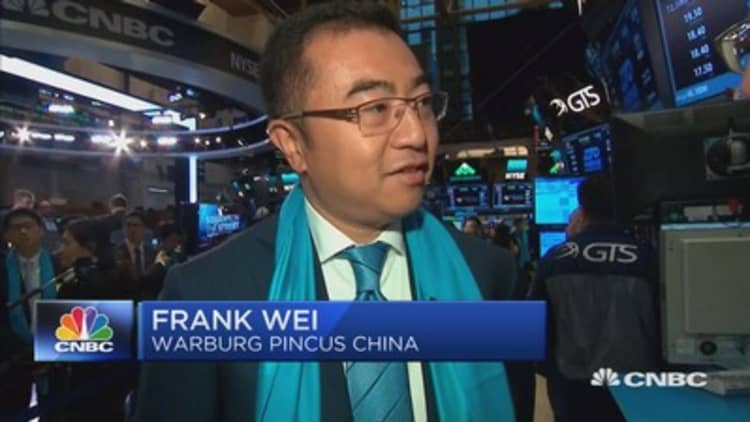When it comes to becoming the next FedEx or UPS, China's package delivery companies have a long way to go.
Analysts consider the massive China market one of the greatest opportunities in e-commerce, and as shopping online increases, so does the number of packages. The business potential is all the more apparent now, after Chinese e-commerce giant Alibaba's earnings topped Wall Street's expectations Wednesday, and Chinese logistics firm ZTO Express went public last week in the largest U.S. IPO of the year.
But global expansion for delivery companies from China is likely limited for now.

"The enthusiasm about these companies should really be enthusiasm about China's growth and economy and not about these companies and them going global," said Scott Kennedy, deputy director, Freeman Chair in China Studies at the Center for Strategic and International Studies.
"It's not that they couldn't down the road," he said, adding that Chinese firms don't "present the same challenges to global leaders around the world as they do in telecom" with the rise of Huawei, for example.
China's couriers have successfully tackled their home market, however. By 2015, China had become the largest express delivery market in the world, with 204.5 billion yuan ($30.2 billion) in annual revenue, according to Deloitte.
How delivery in China is different than in the US
Chinese delivery firms' strategy behind much of the growth is unique to the country. Compared with the United States, sending and receiving packages within China can be quick and inexpensive. Online orders of books and other goods often arrive by the next day, even on weekends. It's also possible to send parcels across town for same-day delivery, all for a negligible cost. Much of the Chinese delivery business depends on partners and a large fleet of couriers who rush packages through the country and across cities, by such modes as bike, moped, subway or truck.
"The reality, though, it's going to be very hard for them to become global players," said Shaun Rein, managing director, China Market Research Group.
He said many of the companies' management teams and infrastructure aren't developed enough for international operations.
Officially established in 2013, ZTO Express operates through about 7,700 network partners, according to the firm's prospectus. The company gets about three-fourths of its business from Alibaba and has 26,000 direct employees in China and more than 200,000 across its entire network.
In comparison, UPS has 444,000 employees worldwide and 6,194 in China; FedEx 400,000 total, including almost 9,000 in the country. UPS, the world's largest package delivery company, entered the China market in 1988, and its Asia-Pacific headquarters are in Singapore. In terms of infrastructure, UPS has 228 operating facilities in China, while ZTO has 74 sorting hubs.
A deal with the US Postal Service — or not?
Fewer brick-and-mortar facilities may make Chinese firms more nimble, but maintaining a large labor force can be a challenge when it comes to expanding into other countries that pay their workers more. Within China, labor costs could also rise, as employees demand more money given the manual nature of the work and air pollution, Rein said.
Other aspects of the domestic Chinese market make it very competitive. More than 11,000 enterprises had authorization to operate express delivery businesses as of the end of 2014, according to a Deloitte study last year. About 60 to 70 percent of the Chinese market was spread among the top 10 players, including the state-backed delivery firm EMS. That compares with the dominance of just two companies — UPS and FedEx — in the United States.
However, the desire to grow beyond China is there.
"We plan to expand our global footprint. We plan to start with the U.S. marketplace," ZTO's chief financial officer, James Guo, told CNBC in a phone interview last week.
Guo said ZTO recently entered into a partnership with the United States Postal Service for cross-border transactions. However, a USPS spokesman said he could not confirm the existence of any partnership with ZTO and would not comment on USPS operations in China.
ZTO did not respond to a CNBC request for a follow-up on the status of any deal with the USPS.
In any case, as cross-border transactions are only about 1 percent of ZTO's business, Guo said the company will focus for now on China. The firm holds about 14.5 percent of Chinese market share by parcel volume, according to its prospectus.
Whether helped by favorable protectionist policies or pure competitive edge at home, Chinese delivery companies may one day be established enough to grow significantly outside their home market.
"The revenue base is going to be able to fund (operations) in markets where they think they'll be competitive" such as Africa or South America, said Derek Scissors, chief economist at China Beige Book International, which regularly surveys Chinese businesses.
In addition, "rather than establish a new brand in a very competitive market," he said, a Chinese company "can buy a brand and keep it" as theirs.


